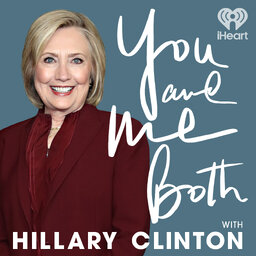Difficult Conversations (with Ambassador Linda Thomas-Greenfield and Sarah Stewart Holland)
It’s almost that time of year for holiday gatherings with family and friends. And with that comes lots of eating, maybe lots of cooking, and, for many, a growing list of topics that are off the table for discussion, as they run the risk of derailing an otherwise festive occasion.
Of course, there are times when we need to have difficult conversations, and to be able to disagree with others without threatening our connection to the people we love, or the vital work we need to get done.
On today’s episode, Hillary speaks with Sarah Stewart Holland and Ambassador Linda Thomas-Greenfield, two people who are highly skilled at navigating difficult conversations, and can share stories and offer advice from the front lines.
Sarah is a progressive Democrat who ran for office (and won!), and is raising three kids, in the very red state of Kentucky. On the Pantsuit Politics podcast, she and her more politically conservative co-host Beth Silvers have been tackling challenging conversations since 2015. They’ve written two books to help others do the same, including the book club favorite I Think You’re Wrong (But I’m Listening): A Guide to Grace-Filled Political Conversation.
Linda, the United States Ambassador to the United Nations, has been engaged in high-stakes, complex negotiations for decades. Over the course of her 35-year career with the Foreign Service, she served as U.S. Ambassador to Liberia, the Assistant Secretary of State for African Affairs, as the Director of Human Resources, and held posts abroad in Pakistan, Kenya, Nigeria, Switzerland, and elsewhere.
You can read the full transcript HERE.
In 1 playlist(s)
You and Me Both with Hillary Clinton
Hillary Clinton sits down for candid, in-depth, and sometimes hilarious conversations with people sh…Social links
Follow podcast
Recent clips

President Bill Clinton
36:26

Believe in Yourself (Encore with Brandi Carlile and André De Shields)
47:53

Abortion Care After Dobbs (with Dr. Yashica Robinson & Gov. J.B. Pritzker)
42:29
 You and Me Both with Hillary Clinton
You and Me Both with Hillary Clinton